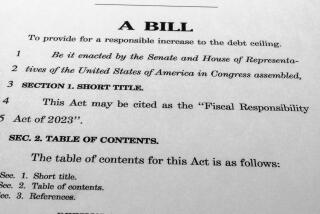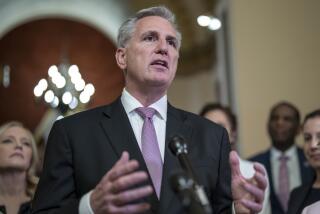Gingrich to Borrow $300,000 From Dole to Pay Fine
- Share via
WASHINGTON — In a surprising twist to his lengthy ethics ordeal, House Speaker Newt Gingrich announced Thursday that he will accept a personal loan from 1996 GOP presidential nominee Bob Dole to pay a $300,000 penalty.
After informing Republican colleagues of his decision during a closed-door meeting, Gingrich stood in the well of the House chamber to say that he felt a “moral obligation” to reimburse taxpayers with “personal funds.”
Terms of the loan require Gingrich to repay the principal and all interest accrued at 10% annually by 2005. No payments are due until then.
“I have arranged to borrow the money from Bob Dole, a close personal friend of impeccable integrity, and to pay it back,” Gingrich said. “This is my duty as speaker and I will do it personally.”
The remarkable turn of events could make the former Kansas senator, who at times has bitterly disagreed with the combative speaker, a financial white knight coming to the rescue of Gingrich’s sagging political career with the stroke of a pen.
Their bittersweet relations had not warmed much--at least publicly--despite Gingrich’s vigorous support for Dole’s presidential campaign. Dole told reporters that, before offering Gingrich the loan Tuesday, he had not spoken with the speaker since just after the election. Dole also said that he was offering the loan for the sake of the Republican Party, not simply as a financial escape hatch for Gingrich.
“It’s an arm’s-length transaction between two friends,” Dole said. “I wanted to help the Republican Party.”
The deal between Dole and Gingrich requires that the speaker carry term life insurance covering the amount of the loan. The agreement also specifies that Dole cannot forgive the loan and that the loan would be replaced with a commercial bank loan if the former senator ever becomes a registered lobbyist. The Ethics Committee is reviewing terms of the loan.
Whether this unusual deal will actually bring an end to Gingrich’s political trauma remains unclear.
In a harbinger of more political rancor likely to come, Democrats reacted to news of the loan with anger, lambasting Gingrich for escaping the penalty without any immediate financial pain and attacking Dole for offering a “sweetheart” loan to the speaker that would be unattainable to average Americans.
“Newt Gingrich has said for years that he’s against the welfare state but now we find he’s on the Dole,” said Rep. David E. Bonior (D-Mich.), one of the speaker’s most aggressive critics. “What average American could walk into [the] local bank, take out a commercial loan for $300,000 with no collateral, and no payments due until the year 2005?”
Although Gingrich’s office said that his loan meets “commercial bank standards,” banking experts said that the agreement is not the type financial institutions normally would make.
Bert Ely, a banking consultant based in Alexandria, Va., said: “The vast majority of the banks out there would not make this loan.”
While banks do make character loans based on borrowers’ unique situations, it would be unusual for a bank loan to defer all payments until 2005, as Gingrich’s deal does, Ely and other experts said.
No Payments Until 2005
Gingrich’s agreement amounts to an eight-year, zero-coupon bond with a prepayment option, the bankers said. The interest rate of prime plus 1.5 percentage points would require Gingrich to pay a lump sum of about $640,000 if he chooses to make no payments until 2005.
“Banks normally like to see the debt serviced,” said Martin Mayer, a finance expert at the Brookings Institution. “The bank auditors frown on no payments.”
Banking experts said that most financial institutions would have insisted on a lien on Gingrich’s home, or required his wife, Marianne Gingrich, who controls most of the couple’s assets, to co-sign the loan agreement. But even without those safeguards, the experts said that Gingrich’s strong earnings potential after he leaves Congress makes it unlikely that he would default on the loan.
Last fall, Gingrich admitted that he had violated House rules by submitting false statements to the House Ethics Committee, which was investigating the tax-exempt status of a college course he taught.
Gingrich then struck the legislative equivalent of a plea-bargain, saying that he had failed to seek proper legal advice and had sent erroneous letters to the committee. He agreed to the committee’s penalty--$300,000 to repay the federal government for the cost of the investigation.
Calls It Reimbursement
On Thursday, Gingrich stressed that he was not paying a fine but rather reimbursing “the American taxpayers $300,000.” Democrats, however, disagreed with that interpretation and frequently referred to the payment as a “fine.”
Whatever the legal definition, Gingrich had been unable to shake questions of whether the payment would come from his personal accounts or whether others would help him meet the obligation.
In his comments on the House floor, Gingrich listed the four payment options he had considered: paying with his campaign funds, establishing a legal defense fund, going to court to compel his law firm to pay and paying himself.
A “legal trust fund was in many ways the most appealing,” he said, because it had the support of many in Congress and several would-be contributors.
But many GOP leaders pressed Gingrich to pay with his own funds, fearing that any effort to avoid personal responsibility would cause negative reactions among voters and in their party.
Yet Gingrich had said that his wife objected to the use of their personal funds to pay the penalty, fearing that it would cripple the family’s future financial security.
“Marianne and I have spent hours discussing these options,” Gingrich said on the House floor, adding that the couple eventually agreed it would be best to pay the penalty out of personal funds. “Any other step would simply be seen as one more politician shirking his duty and one more example of failing to do the right thing,” he said.
But the couple reached that decision only after Dole offered the loan.
“Up to the last moment we were looking at a variety of options,” said Christina Martin, Gingrich’s spokeswoman. “At the last minute, we received this completely unexpected overture by the senator.”
Martin, who was the spokeswoman for Dole’s unsuccessful presidential campaign last year, said that the idea for the loan was the former Senate majority leader’s alone, adding that Dole was concerned Gingrich might not pay the penalty with his own money. “The senator has sent quiet words in the past to the speaker that he would like to see him pay the fine out of his own personal funds,” she said.
Dole is a wealthy man who can write a personal check for $300,000. Dole and his wife, Elizabeth, reported a joint 1995 income of $583,869 and listed their worth at between $2.3 million and $7.7 million.
Since losing the presidential election, Dole has been paid large fees for television appearances and for serving as an advertising pitch man for Visa credit cards. He recently joined the prestigious Washington law firm of Verner, Liipfert, Bernhard, McPherson & Hand, which lobbies for a number of high-profile clients.
Gingrich, on the other hand, would be more hard pressed to make a lump-sum payment of $300,000. He earns $171,500 as speaker and is limited by ethics rules from receiving outside income that may appear to conflict with his legislative duties. His most recent financial disclosure form, filed last May, shows that he and his wife held assets valued between $302,000 and $857,000. It also showed that Gingrich earned $471,348 in net royalties for his best-selling book, “To Renew America.”
Republicans praised Gingrich’s decision to accept Dole’s loan and said that they expected it would close the door to all questions about the ethics violations.
“It is the end. It’s over,” House Majority Leader Dick Armey (R-Texas) said of the ethics controversy that has swirled around Gingrich and his House leadership since the start of the 105th Congress. “The speaker was held to a higher standard than what was reasonable. He deserves our appreciation and, quite frankly, deserves our applause.”
Asked if the public would see the deal as the GOP rallying to support one of their own, Rep. David M. McIntosh (R-Ind.) agreed that some might view it that way--but said that he does not think that would be bad. “I think the public will see it as Republican leaders closing rank around Newt,” he said. “I don’t see anything wrong with that. This puts the whole ethics thing behind us.”
Deal Called Too Cozy
Not surprisingly, Democrats saw the matter in a starkly different light.
Bonior said that the deal between Gingrich and Dole would appear too cozy for most Americans to accept. “I like and respect Bob Dole but how could Newt Gingrich take a $300,000 loan from him without violating the prohibitions on gifts and gratuities--especially since Mr. Dole works for a large lobbying firm with interests before Congress?” Bonior said at a news conference. “Isn’t that a conflict of interest?”
Bonior said that Gingrich should have gone to a bank and arranged to make regular payments as any other person in similar circumstances would have done.
But J. Randolph Evans, legal counsel to Gingrich, said that Dole’s loan was no more unusual than what average Americans do for each other. “Most people, when faced with the need for a loan, would go first to family, friends and then go to a bank,” he said, adding that Gingrich and Dole have “a long and personal relationship. This was a loan from a friend to a friend.”
Evans also said that Gingrich preferred accepting the loan from his “best friend” over seeking a commercial bank loan because that might raise questions when banking issues come before the House.
Sometimes-Testy Relationship
The Dole-Gingrich relationship, however, has been testy at times in the past. Gingrich once called Dole the “tax collector for the welfare state” for suggesting that tax increases were necessary to balance the federal budget in the late 1980s.
In turn, Dole described Gingrich, then a fire-breathing backbencher, as more sound than substance. “His agenda is in getting attention so he has to go after large targets,” Dole said dismissively. “He’s making a lot of noise, but I haven’t seen any impact.”
Evans said he worked out the loan agreement personally with Dole, asking him point-blank about his lobbying activities with the law firm. Dole, he said, flatly stated that “he is not and does not intend to be a lobbyist.” Still, Evans said, he added a clause to the loan agreement that would force Gingrich to replace Dole’s money with a commercial loan “if Dole changes his mind at some later time and becomes a registered lobbyist.”
Despite the loan’s unique aspects, “this is not a sweetheart deal by any stretch of the imagination,” said Joseph DiGenova, who served as a U.S. attorney during Republican administrations. “That’s just a red herring,” he said, calling the loan “an ethical, commendable way to deal with a thorny issue.”
Times staff writers Edwin Chen, Marc Lacey, Art Pine and Robert Rosenblatt contributed to this story.
(BEGIN TEXT OF INFOBOX / INFOGRAPHIC)
The Terms of Their Deal
Terms for the loan Newt Gingrich is receiving from Bob Dole:
* Amount: $300,000.
* Payable: Within eight years.
* Interest rate: 10% (prime rate plus 1.5%)
* Due: By 2005. No payments are required before then.
* Highest possible payback: $640,000 in interest and principal if Gingrich pays nothing until the due date.
****
WHAT HE TOLD THE HOUSE
”. . . Any other step would simply be seen as one more politician shirking his duty and one more example of failing to do the right thing.”
More to Read
Get the L.A. Times Politics newsletter
Deeply reported insights into legislation, politics and policy from Sacramento, Washington and beyond. In your inbox twice per week.
You may occasionally receive promotional content from the Los Angeles Times.










